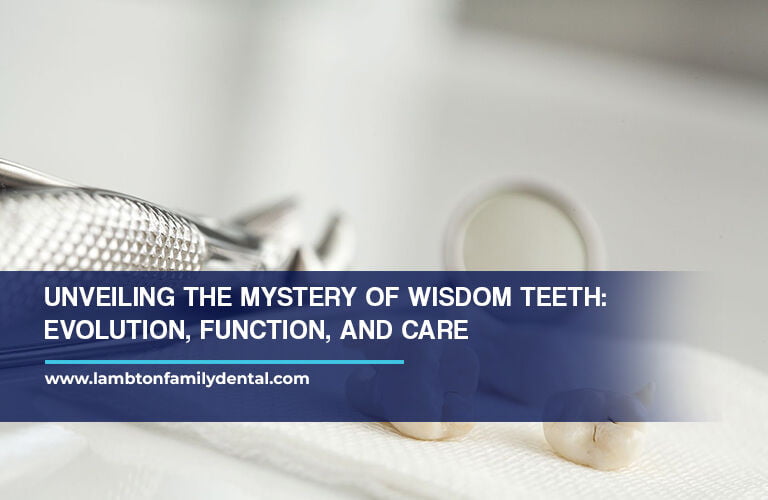Wisdom teeth, often referred to as third molars, have long puzzled scientists and individuals alike. Why do we have them? What purpose do they serve? These questions delve into the depths of human evolution and oral health. In this article, we embark on a journey to understand the intricacies of wisdom teeth, exploring their evolution, function, common problems, management, and the importance of oral care.
What is a Wisdom Tooth

A wisdom tooth, scientifically known as the third molar, is the last tooth to emerge in the human mouth. Positioned at the very back of the dental arch, these molars typically appear during the late teens or early twenties, marking a milestone in dental development.
Evolution of Wisdom Teeth Development
Wisdom teeth are a testament to our evolutionary history. They served a vital function in our ancestors’ diets, which primarily consisted of coarse, rough foods that required extensive chewing. The development of wisdom teeth was essential to ensure our ancestors could effectively grind and process their food for digestion.
Genetic Influences
Genetics play a crucial role in determining whether an individual will develop wisdom teeth and how they will erupt. Studies have shown that variations in certain genes can influence the timing and position of wisdom teeth development.
Not everyone develops wisdom teeth, and their presence or absence can vary widely among individuals. While some individuals may have all four wisdom teeth, others may have fewer or none at all. This variability underscores the dynamic interplay between genetics, environment, and evolutionary history.
Wisdom Teeth Function and Purpose
Wisdom Teeth Anatomy
Wisdom teeth typically emerge at the back of the mouth, behind the second molars. They are the last set of molars to erupt, usually appearing between the ages of 17 and 25. Despite their late arrival, wisdom teeth were once essential for our ancestors’ survival, aiding in the breakdown of tough foods.
Functionality
The primary function of wisdom teeth lies in their ability to supplement chewing and grinding capabilities. In the past, when diets were more rugged and demanding, wisdom teeth played a pivotal role in the oral landscape, ensuring efficient food processing and digestion.
Wisdom Teeth and Jaw Size
One intriguing aspect of wisdom teeth is their correlation with changes in jaw size over time. As human diets evolved and became more refined, jaw sizes decreased, often resulting in insufficient space for wisdom teeth eruption. This mismatch between jaw size and tooth development can lead to various complications.
Common Wisdom Teeth Problems and Complications

Wisdom teeth have the potential to cause a range of issues, including overcrowding, misalignment, and impaction. These scenarios can result in wisdom teeth pain, discomfort, and increased susceptibility to dental problems such as decay and infection.
Impaction
One of the most prevalent issues associated with wisdom teeth is impaction. When there isn’t enough space in the jaw for the wisdom teeth to fully erupt, they may become trapped or partially emerge, causing discomfort, pain, and potential infection.
Pain and Discomfort
Wisdom teeth can also cause significant pain and discomfort, especially if they become impacted or infected. Individuals may experience swelling, tenderness, and difficulty chewing or opening their mouths fully.
Infections
Infections around wisdom teeth can occur due to the accumulation of bacteria and food particles in the partially erupted teeth or impacted areas. These infections, known as pericoronitis, can lead to swelling, pain, and even fever if left untreated.
Management and Treatment Options
Addressing issues related to wisdom teeth requires a nuanced approach. Luckily, there are various management and treatment options available for individuals grappling with wisdom tooth complications. From preventive measures to surgical interventions, seeking solutions that prioritize comfort, efficacy, and long-term wellness.
Wisdom Teeth Removal
In many cases, wisdom teeth extraction is the recommended course of action to prevent or alleviate problems associated with wisdom teeth. During the extraction process, the dentist surgically removes the affected teeth under local or general anesthesia.
Surgical Procedures
Wisdom teeth removal may involve surgical procedures, especially if the teeth are impacted or positioned deep within the jawbone. Oral surgeons are proficient in performing these procedures safely and effectively, ensuring minimal discomfort for the patient.
Recovery and Aftercare
Following wisdom tooth extraction, proper care and attention during the recovery period are essential. Patients should follow post-operative instructions provided by their dentist or oral surgeon to manage pain, promote healing and prevent complications.
- Follow post-operative instructions provided by your dentist or oral surgeon diligently.
- Take prescribed pain medication as directed to manage discomfort.
- Apply ice packs to the cheeks outside the extraction area to reduce swelling.
- Maintain a soft diet consisting of liquids and soft foods for the initial days post-extraction.
- Avoid using straws, as sucking motions can dislodge blood clots and impede healing.
- Gently rinse your mouth with warm saltwater to keep the extraction site clean and promote healing.
- Avoid vigorous brushing and flossing around the extraction site to prevent irritation.
- Attend follow-up appointments with your dentist or oral surgeon for monitoring and evaluation of the healing process.
Prevention and Oral Care
Prevention reigns supreme. As the adage goes, an ounce of prevention is worth a pound of cure, and nowhere is this more evident than in the realm of oral care.
Maintaining Oral Hygiene
Regular dental check-ups and proper oral hygiene practices are key to preventing wisdom teeth problems and maintaining overall oral health. Brushing, flossing, and using mouthwash can help keep the mouth clean and reduce the risk of infections and decay.
Monitoring Wisdom Teeth Development
Dentists play a crucial role in monitoring the development of wisdom teeth and identifying potential issues early on. Routine dental examinations and X-rays can help detect problems before they escalate, allowing for timely intervention and treatment.
Final Thoughts
Wisdom teeth are more than just vestiges of our evolutionary past; they serve as reminders of our ancestors’ dietary habits and oral health challenges. Understanding the evolution, function, and common problems associated with wisdom teeth is vital for maintaining optimal oral health. By prioritizing regular dental care and seeking professional guidance when needed, individuals can navigate the complexities of wisdom teeth with confidence.
For expert guidance and wisdom tooth extraction in Sarnia, contact Lambton Family Dental at 519-344-5747. Our experienced team is here to ensure your oral health journey is smooth and comfortable.
With knowledge and care, we can embark on a path towards healthier smiles and brighter futures.

